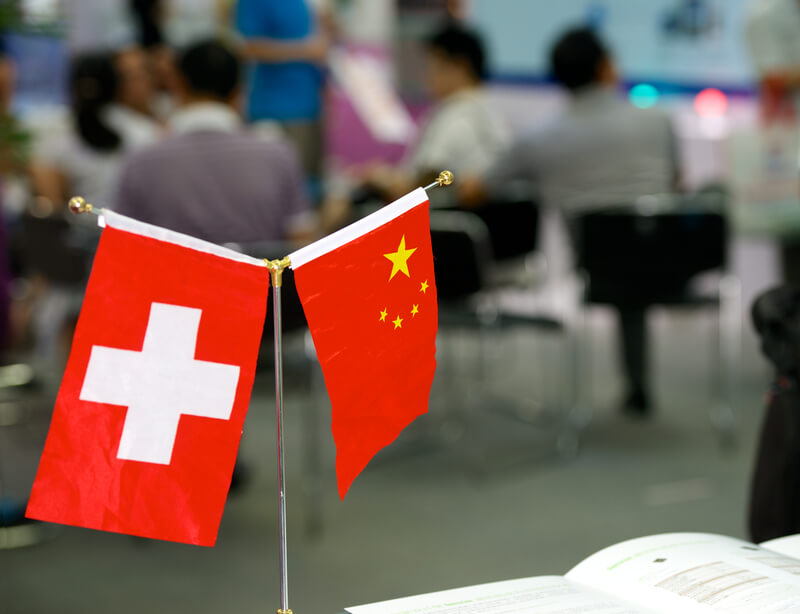By Tenzin Dharpo
DHARAMSHALA, Aug. 24: The renewal of a ‘secret deal’ signed in 2015 between Switzerland and China that allows Chinese authorities to conduct investigation in the country and deport Chinese nationals, have stirred the national debate over Chinese influence and the ongoing courtship between Bern and Beijing.
Swissinfo.ch reported on Aug. 23 that talks are in progress to renew the controversial agreement that ends in December. The agreement allows Chinese officials to enter Switzerland for a period of two weeks – without official status – to investigate Chinese citizens, and deport them. The Swiss media cited an official from the Swiss State Secretariat for Migration (SEM) who said “administrative agreement” have barred the deal to be made public since 2015.
Chinese citizens including rejected asylum seekers, illegal travellers, and those without identity papers are said to be affected by the deal. However, many say, the deal can be used to target Chinese nationals who are fleeing the authoritarian regime including Tibetan refugees and critics of Beijing who are seeking asylum in the country.
Since June 2016, Tibetans are officially recognized to be Chinese nationals indicating a shift in the Swiss government’s foreign policy on Tibet. Although the Bern administration has claimed that the change in policy have not affected Tibetan refugee’s eligibility for asylum, approval ratings for Tibetan asylum seekers have fallen drastically over the years. Only 54.8% of the Tibetan applicants qualified in 2016 compared to 71.8% in 2015 and 85.8% in 2014, Swiss media reported.
SEM spokesman Daniel Bach told the Keystone-SDA news agency on Sunday that Tibetan and Uighur asylum seekers are not affected by the agreement and that they would not be sent back to China due to the threat of persecution they face. Despite the reassuring sentiments by the Swiss official, there are looming doubts within the small Tibetan community there.
Thinley, a Tibetan residing in Switzerland told Phayul that the Bern government’s official recognition of Tibetans as Chinese citizens leaves Tibetan asylum seekers vulnerable to various eventualities. He said, “The fact the deal has to be kept secret since 2015 and was recently exposed is a major red flag. I believe Tibetan asylum seekers and Chinese dissidents are exposed to be cracked down under this deal.”
“Many of the 300 odd Tibetan refuge seekers in Switzerland were interviewed via telephone under what is known as the ‘LINGA analysis’ where details like dialect, socialization traits of the subject are examined by a person at the other end of the telephone. Who is to say that these procedures are not under the purview of the secret deal?”, asserts Thinley.
The opposition have also chimed in to reject the deal. Fabian Molina, an MP from the social democrat party, told the NZZ am Sonntag that the standing deal with China should not be renewed and that it was “absolutely unacceptable”. Fellow lawmaker Sibel Arslan, said she will raise the issue at the next meeting.
SEM says the agreement has been implemented just once until now, when a Chinese delegation came to Switzerland in 2016, leading to the deportation of 13 individuals, including four asylum seekers.
The courtship between Beijing and Bern over the years have meant that the lucrative economic gains have come for both the nations with the relationship set to improve further with the signing of the MoU last year for cooperation on trade, investment and finance for projects in third countries along the routes of the Belt and Road Initiative.
At the receiving end of the prosperous economic partnership is the Swiss government’s changing outlook towards Tibetan asylum seekers and China’s far reaching influence in the country. In March this year, on the anniversary of the Tibetan uprising day, the government of the French speaking canton of Vaud conveyed a message from the Chinese ambassador urging the 10 municipalities to abstain from raising the Tibetan flag as it would contradict the “One China Policy” of the Swiss government.











4 Responses
that is a lesson the never expect from any other country around the world but Tibetan is dreaming too much and expecting too much the last 70 years. as you do your country they also doing their country for very simple logic.
For an understanding of the global aspects of the Tibetan situation, acquaint yourself with with historical aspects of others who were subjugated in some manner or another through history.
https://www.youtube.com/watch?v=QTtD8bxROmI
Switzerland, under the guise of “neutrality” did lucrative business with the rabid fans of the Final Solution, the Nazis. Now they cozy up to an authoritarian CCP regime which oversee concentration camps where Uighur women are forcibly sterilized. In other words – business as usual.
Switzerland is a small country–how do you think they carved out their domain in the global scheme among the bigger and more powerful? Besides the banking industry, there is also the Vatican guards. Are those who guard the Dalai Lama all Tibetan? The Vatican has diplomatic relations (embassies) across the globe. The Tibetans should contemplate having embassies as well for diplomatic relationships for the Tibetan cause. Then perhaps it becomes obvious who actually would go far enough to support, although there is plenty of talk of human rights and such in the global arena. Just look at Taiwan. Many of the settlers in Taiwan are not the aboriginal people of the islands but from refugees from South China. In the game of averages, Beijing is very well aware of dominant faiths that are practiced across much of the globe. Don’t forget, the Dalai Lama is not the only one not being invited to China.